Images courtesy of Universal Pictures.
Nathan (Idris Elba), Martin (Sharlto Copley), Mare (Iyana Halley) and Norah (Leah Sava Jeffries) attempt to survive an attack from a rogue lion in Beast, directed by Baltasar Kormákur.
Whether it’s trying to reach the world’s highest mountain peak in Everest or a doctor breaking the Hippocratic Oath in an effort to protect his drug addict daughter in The Oath, Icelandic filmmaker Baltasar Kormákur has the ability to shift between blockbuster productions and smaller passion projects. Beast has him channeling the former as Idris Elba portrays a recent widower on an African trip with his two daughters and becomes the target of a man-eating rogue lion. Obviously, for safety reasons the animal had to be a CG creation, with Visual Effects Supervisor Enrik Pavdeja hiring Framestore as the main vendor as well as BlackGinger. “Baltasar had a good understanding of what he wanted for Beast, and with that in mind he allowed us to contribute and lead the film from a visual effects point of view,” Pavdeja notes. “In total, we have 240 shots; however, on this show we had eight or nine anywhere between 5,000 to 10,000-frame shots [with BlackGinger being responsible for 50].”
Special effects built a stage car where you could take it apart completely and rebuild it again depending on the needs of the shot.
A year was spent by Framestore developing the lion assets.
Master shots were broken down into what were called ‘child shots.’ “Even just 10 shots of a 10,000-frame shot is still quite a crazy number,” Pavdeja notes. “The main driving force behind the big shots was previs by The Third Floor. That’s where we started figuring out how these shots were going to come together and began to understand the detail of what the lion action was going to be, because a lot of this work relied on interaction, not so much following the lion through the frame.” Obvious stitches were to be avoided. “We try to find clever situations such as doing a paw print or a bit of car coming to a yield,” Pavdeja explains. “All of the time we’re trying to keep some sort of live element in the plate that we could then bridge the two shots.” The main cinematic reference was The Revenant, which features Leonardo DiCaprio being mauled by a grizzly bear. “That bear scene was the piece we used closely as inspiration for the fight at the end because it’s a brilliant piece of visual effects with a lot of interaction. It’s visceral,” Pavdeja declares. “We’re close to camera. And it’s a long take. There are maybe three cuts, which is basically what we tried to achieve.”
Not only did the lions have to be photorealistic, but also photo natural in their performances.
“That bear scene [in The Revenant] was the piece we used closely as inspiration for the fight at the end because it’s a brilliant piece of visual effects with a lot of interaction. It’s visceral. We’re close to camera. And it’s a long take. There are maybe three cuts, which is basically what we tried to achieve.”
—Enrik Pavdeja, Visual Effects Supervisor

Beast has 240 visual effects shots, with eight or nine of those being anywhere between 5,000 to 10,000 frames long.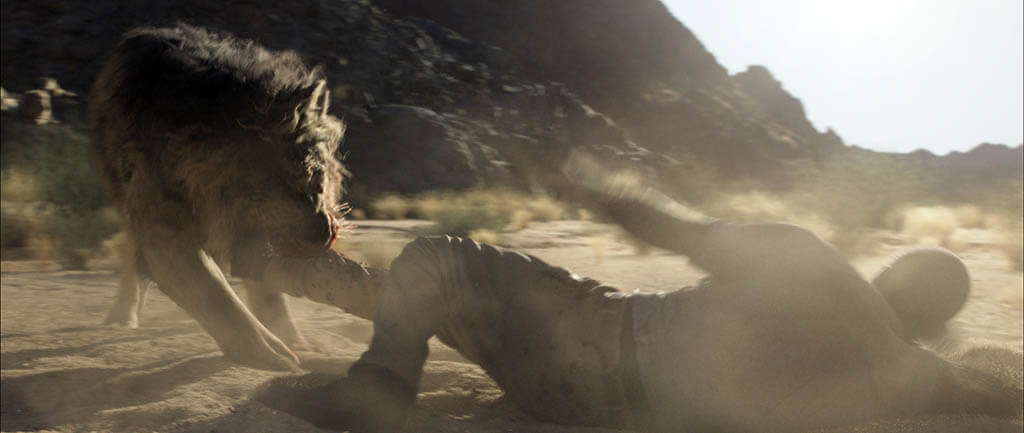
The grizzly bear mauling in The Revenant was a major reference for the finale.
Thousands of reference images of every type of tree, branch and leaf were taken to digitally recreate the environmental assets.
“The claws are some of the most complicated engineering types of devices ever. It’s a fine line between having fluffy-looking claws that look cute in a paw, then, all of a sudden, the claws come out and it looks like a vicious fighting machine. A lot of development went into that.”
—Enrik Pavdeja, Visual Effects Supervisor

There were always three different iterations of simulations to get photorealistic muscles for the lions.
A year was spent developing the lion assets. “With a show like this, a lot of challenge came from creating some digital creatures that were completely photoreal and also photo natural in the way that they performed,” Pavdeja notes. “We had such long shots, we had to change our approach in how we would review the work and how we handled all of that data logistically.” Tools were created that allowed reviews of the ‘child shots,’ which were then automatically inserted into the master shot. “Lions are mostly made of muscles. For every moment and movement they make we had to create different shapes for the muscle and how you read and perceive it, and how the skin goes over it. The animators would go in and animate the different muscle shapes that would then be simulated on top of that. There were always three different iterations of simulations to get a photorealistic muscle. The claws are some of the most complicated engineering types of devices ever. It’s a fine line between having fluffy-looking claws that look cute in a paw, then, all of a sudden, the claws come out and it looks like a vicious fighting machine. A lot of development went into that.”
For obvious safety reasons the lions had to be entirely CG creatures.
“Martin Battles [Sharlto Copley] hugs some lions he has brought up since they were cubs on his big reserve. This was driven by the puppeteering guys as they built specific costumes for them to have that interaction with Martin. We did a digital-double takeover of Martin because the performance of our CG lion didn’t necessarily line up perfectly with his movements. Martin Battles [Sharlto Copley] hugs some lions he has brought up since they were cubs on his big reserve. This was driven by the puppeteering guys as they built specific costumes for them to have that interaction with Martin. We did a digital-double takeover of Martin because the performance of our CG lion didn’t necessarily line up perfectly with his movements.”
—Enrik Pavdeja, Visual Effects Supervisor

The production assembled a massive library of realistic lion reference material which was then incorporated into the rig.
There are two moments of heavy lion interaction. “Martin Battles [Sharlto Copley] hugs some lions he has brought up since they were cubs on his big reserve,” Pavdeja explains. “This was driven by the puppeteering guys as they built specific costumes for them to have that interaction with Martin. We did a digital-double takeover of Martin because the performance of our CG lion didn’t necessarily line up perfectly with his movements.” For the end fight, a stunt performer wore a big lion head and a grey suit to get the proper interaction with Dr. Nate Samuels (Idris Elba). “We kept Idris’ head when it made sense. For the most part, it was a full digital body and digital lion,” Pavdeja adds. The biggest simulation work was the sand interaction. “Simulations would take anything between 24 hours to three or four days depending on which layer we were simulating,” he says. “For example, the first thing we would have to simulate is the lion against Idris. They would be fighting together, the muscles, skin, fur and cloth, and that is one side of the simulation. When we were happy on that front, we had to simulate it against the environment with all of the sand. Then there would be another iteration on top of that where you would end up having to fix certain elements to combine the two correctly together.”
“For the end fight, a stunt performer wore a big lion head and a grey suit to get the proper interaction with Dr. Nate Samuels (Idris Elba). We kept Idris’ head when it made sense. For the most part, it was a full digital body and digital lion.”
—Enrik Pavdeja, Visual Effects Supervisor
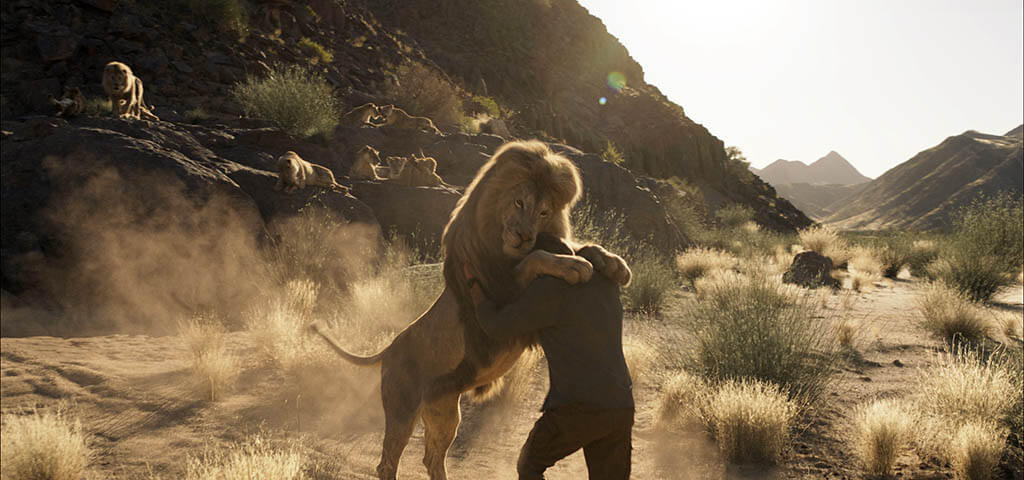
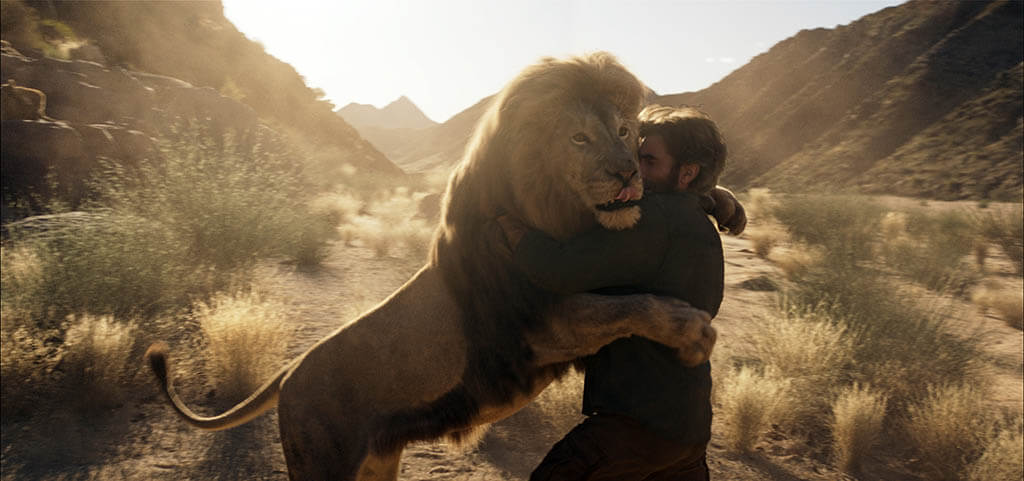
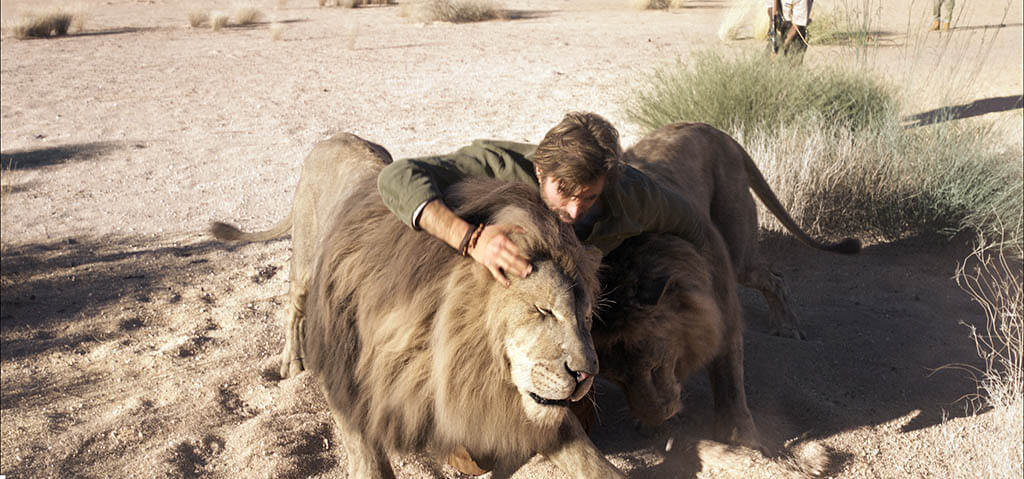
Special costumes were created for stunt performers to interact with Sharlto Copley, which were subsequently taken over by CG lions.
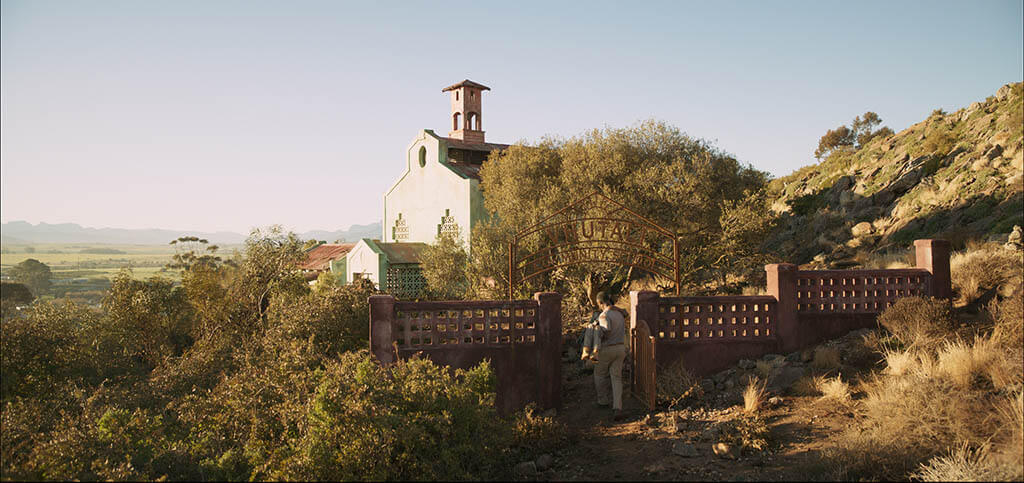

Some of the environments were procedurally generated.
Idris Elba has an on-set conversation with Icelandic filmmaker Baltasar Kormákur.
Two different takes were shot of Idris Elba fighting the lion. “The idea was when we filmed that scene it was one long take, so we filmed it two ways,” Pavdeja remarks. “One way, we had a clean Idris, no wounds and blood. Then we did the same take again with full makeup so everything to do with wounds and blood and all the dressing would be on him. Then throughout the fight, we would then reveal those wounds. Idris being fully digital allowed us, once we had scanned him with all of the wounds on, to reveal those wounds and progress them throughout the shot. In the end the shot was divided into two shots so we had a cutaway, which allowed us more flexibility, but wasn’t the sort of thing you would pay so much attention to in terms of progression. That end fight is so visceral, in the moment and manic, that all you’re looking at is this crazy action-packed moment between a lion and a man.”
